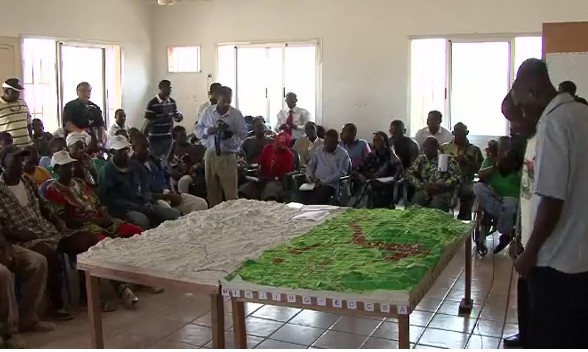Known as the Babongo, Bongo, “Forest people” or as Pygmies this indigenous people inhabit the rainforest of Gabon in West Africa and have an estimated population of around twelve thousand people.
There is no one Babongo language as groups speak three main dialects depending on region. In the central regions variations of Tsogho are spoken, in the South East it is the same but with Teke and Kaning’i as the starting languages. Interpretations of these vary between groups dependent on historical and cultural differences such as contact with Bantu speaking neighbours.
As far as it is possible to tell the Babongo have always been hunter gatherers living in bands of up to twenty people, a situation suiting a traditionally nomadic lifestyle in a bio-diverse environment. Some Babongo, those from Lastoursville and Lebamba, are famed for using nets in their hunting activities, snaring bush meat to complement the plant stuffs provided by Babongo women and their encyclopedic knowledge of rainforest flora. As well as hunting and gathering. the Babongo have historically traded with Bantu farmers exchanging forest goods such as honey and meat for metal tools and guns to aid them in their hunting. Though in some respects this relationships has proved advantageous for the Babongo it has also left them open to exploitation at the hands of the Bantu as a recent UNICEF report shows.
The Bantu often do not share the Babongo’s positive view of themselves as the first people of the earth, yet they are often fearful of them. The Babongo are renowned sorcerers and boast a vibrant animistic tradition called ‘Bwiti’ which centres around the use of the hallucinogenic Iboga plant which some Bwiti experts believe to be the tree of knowledge. According to the Babongo Iboga can facilitate soothsaying, healing, and communion with the dead by liberating the soul of the body for a time.
In light of this many Bantu do not wish to cross the Babongo but unfortunately the same cannot be said for others who today threaten the physical and cultural continuance of the Babongo. Commercial logging is rapidly depleting Gabon’s rainforest with thirty percent already cleared. As a result of the vast roads bulldozed through the forest many Babongo have experienced the traditionally damaging effects of contact with the outside world, disease, violence and governmentality. Mortality rates have risen as the result of the first two of these results of deforestation whilst the governmental contribution has been to begin a resettlement programme to move the Babongo to villages beside the roads flayed from the forest. Here, considered as the backward remnant of Gabonese society, the Babongo suffer discrimination in the form of pitiful levels of access to healthcare and education.
Despite the threat of assimilation there are hopes that the Babongo have a brighter future than the negative developments of recent years may suggest. Logging is being rapidly restricted as national parks are established across the country to encourage eco-tourism. In tandem efforts are being made to enable the Babongo to take their future into their own hands given this potentially beneficial transition. One way in which this is being attempted is through the innovative grassroots use of Participatory mapping technologies which have allowed some Babongo groups to commune and mark out their traditional territories, safe guarding them for future generations.


